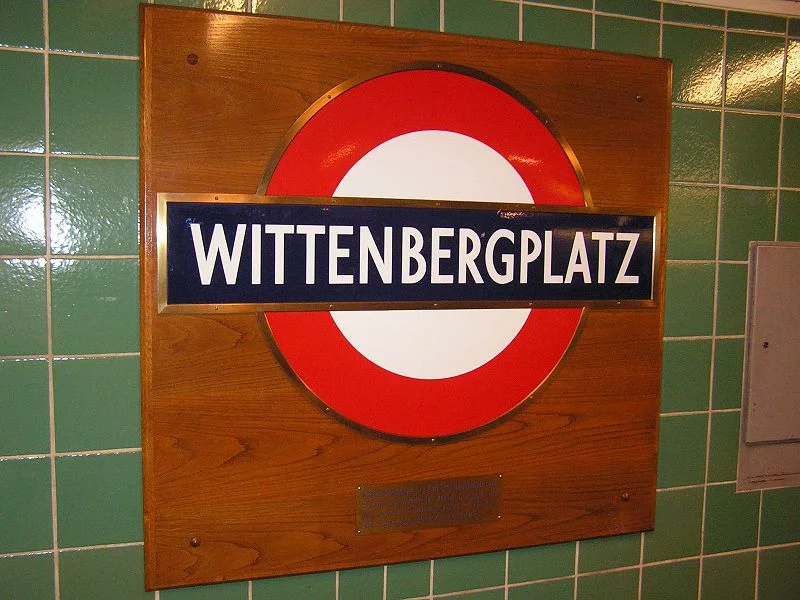The Curious Case of Berlin's Schwabenhass
On one of my many forays down the blackhole of Youtube, I came across a video entitled “Shit Prenzlschwaben Say”. Intrigued, I clicked on the link, partially to improve my ever deficient German language skills, but mainly to use as ammunition to make fun of my wife who happens to hail from Schwaben, a tiny slither of a region in the south of Germany. As every married person knows, the bedrock of a great marriage is constantly taking the piss out of one’s spouse. As the video progressed, I noticed some of the typical idiosyncrasies of my wife’s tribe, but increasingly I found many of them to be rather general. For example, the pretentious naming conventions of middle class Germans, who choose overtly none German names, such as Gwyneth or double barrelled names like Freidrich-Anthony. I would hardly categorise this as typically Schwaben, given that you see these names plastered all over the rear windows of German family cars throughout the country. In an effort to understand the video, I decided to break one of the most sacred laws of the internet: never read Youtube comments.
After only a few entries, I began to realise there was something seriously amiss. Comments such as “Schwaben raus aus Berlin!” (Swabians out of Berlin!) or complaints about the Schwaben dialect were common. What really blew my mind was this particularly pithy number:
“Ich hab euch satt, ihr Dazugezogenen, die denken sie seien Berliner, nur weil sie hier seit 3 Jahren wohnen ......, ihr seid keine Berliner, ihr seid Maden, die die berliner Kultur zerstören, den Einheimischen ihre Wohnungen wegnehmen und kontroverse und freie Bezirke in eure lahmen Dörfer verwandeln. Ihr!!!!! seid keine Berliner!”
(I'm sick of you, you newcomers, they think they're Berliners just because they've lived here for three years......, you're not Berliners, you're maggots who destroy Berlin culture, take away the locals' homes and turn controversial and free districts into your lame villages. You!!!!!! are not Berliners!)
What was going on? Berlin, at least in my mind, was a diverse city. Sure, there are occasional bouts of xenophobia towards foreigners, which is sadly typical of many European cities in 2018, but xenophobia towards a very particular group of Germans? Well, that was a new angle.
I put my black belt Google skills to work and quickly came across a Wikipedia entry for the term “Schwabenhass” (Swabian hate). It turns out, there is a historical basis for not liking Swabians in Berlin, with people leaving the city in the 19th century after an influx of their southern cousins. Alongside the historical context, there were more recent photos of various types of graffiti both welcoming “Schwabees” in a play on the recent “Refugees Welcome” signs seen throughout Germany and another demanding that Schwaben leave the city of Leipzig and return, of all places, to Berlin. Frankly, none of this was making sense. Was “Schwabenhass” a real thing, or was I caught in some impenetrable German joke that was at once artistic statement and colloquial gag.
Further reading uncovered various incidents of pro and anti-Schwaben activity that had occurred over the years in what seemed like an escalating tit for tat war of words and more oddly, spätzle (German pasta). The former president of the Bundestag, Wolfgang Thierse, had taken exception to the influx of Schwaben to his home city of Berlin. In an oddly aggressive broadside, Thierse had declared that Swabians should respect Berlin culture, adding "They come here because everything is so colourful and so adventurous and so lively, but when they've been there for a while, they want it back to the way it was at home - it doesn't add up." His displeasure was further increased by the changes in naming conventions of certain foods in his local bakery, with the Berlin word for bread roll “Schrippen” being changed to the Southern word “Wecken” or the Southern word "Pflaumendatschi" being used instead of the Berlin “Pflaumenkuchen”.
Nomenclature aside, Thierse’s complaints were met in surreal fashion by a group calling itself “Free Schwabylon”, who reacted to the politicians damning indictment of the Swabians by throwing a bowl of traditional Swabian spätzle over the head of a local statue. Truly, this must be one of the dumbest arguments that has ever been conducted by grown adults, or so it would seem.
Further digging it soon became apparent that the real argument had very little to do with a small group of Southerners, changing the names of local cakes and chucking pasta at monuments and everything to do with the very real problem of gentrification. Berlin, for all its faults, has a very particular culture that has evolved through its incredibly elaborate history. From National Socialism, the war years, the building of the wall, the fall of the wall and its eventual return as the capital of a united Germany, Berlin has often been the subject to the whims and machinations of outsiders. Throughout its history, it has also attracted societies fringe elements, whether migrants, squatters, punks or artists. This milieu has created a very particular city, both seat of national government and city of constant alternative. Today, it has a new challenge, one brought about by the desire of faceless developers and unscrupulous landlords to milk the city’s most creative, dilapidated and attractive areas for as much profit as possible.
Rents are being increased, artwork is being hidden by glass towers that architecture forgot and increasingly the areas of the city that were made popular by its residents are being plundered and sanitised to appeal to new class of bland middleclass homeowners. Although labelled as “Schwaben”, the new arrivals to Berlin that so annoyed Thierse actually come from all over the Western states of Germany. Schwaben, in this context, does not really mean the spend thrift southerner, but actually more like yuppie.
Sadly, the future does not look bright for the culturally diverse and creative hub that was modern Berlin. It is more likely it will become similar to London, where the poorest members of society are forced out to make way for those who can afford astronomical rents and lattes served from a vintage shoe. I expect Berliners will fight tooth and nail to prevent this, but as with many David and Goliath battles, the winner is rarely the combatant with a slingshot, but rather the giant with the heavy blunt object.









